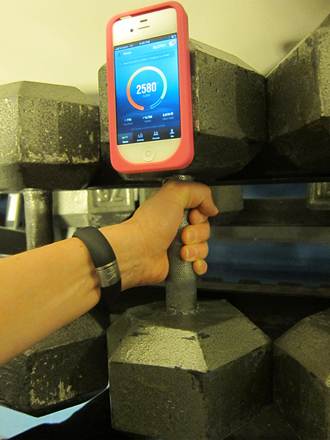
Bill Gates made a splash last week with a compelling case for accurate measurement and clear goals in the fight against global poverty, hunger and infectious disease. "I have been struck by how important measurement is to improving the human condition," says Gates in his annual letter. These words struck a chord not only because I work in international development, but because I believe the same approach applies to tackling the obesity epidemic.
Thirty-six percent of adults in the United States are obese, as are over 10 percent worldwide, making the global impact of related chronic diseases as vexing as infectious disease and under nutrition. The explosion in new technologies to track everything from our sleep to our miles logged enables a new approach to health and fitness -- data-driven, measurable, visual and social.
Until recently, the bathroom scale, the stopwatch and the workout journal were the easy go-to "technologies" for measuring our progress in the gym. According to a new Pew Research study, 69 percent of Americans track a health indicator for themselves or a loved one -- nearly half of whom reported that this has changed their approach to health. Culturally, it seems we are ready to get on board. The new generation of activity trackers and apps showcased last month at the Consumer Electronics Show are increasingly affordable, user-friendly, and can be synced to our smart phones. If the quantified self movement picks up, and as the technology improves, we stand to gain new insights into human behavior and the science behind what works in fitness and health.
Could activity trackers create "nudges" that make us fitter and healthier on a large scale?
Just as a car speedometer creates real-time awareness of our driving speed -- which we sometimes pay attention to, and other times ignore -- what would be the impact of having the human dashboard equivalent? Early studies on the old school version of today's activity trackers, the pedometer, show that being reminded of activity or inactivity was a motivating force in improving activity levels. There is also the potential to learn not just what motivates us to change our behavior, but who and how. Through activity tracking linkages with social media, people are forming their own virtual communities that enhance accountability, make progress transparent, and cultivate a virtual cheering squad.
How do we transform individual data points into a constellation of knowledge?
Sure, some people broadcast their workouts on social media sites, but this data sharing is largely haphazard and unorganized. What would it take to leverage the data of the crowd for greater insight into what works in making people fit and healthy? Imagine a crowd-driven experiment of 100,000 people testing the impact of two competing fitness and diet routines. The data privacy concerns raised by the personalized health movement would likely pose similar challenges here, and ensuring a rigorous methodology for a "crowd trial" wouldn't be easy. But these challenges are not insurmountable. At some point, we may even consider sharing our own personal health and fitness data (in an anonymous way) as our version of "data philanthropy" -- a small contribution we can each make towards better scientific understanding.
Insights on the Horizon
With new tools for measurement, we're sure to glean some hints about the impact of real-time, visual data on our day-to-day decisions. Gates is right. Measurement, data and goal-setting are key to improving the human condition -- and not only in finding the right policies to foster well-being, but also in supporting individuals' efforts to own their own health and fitness.
